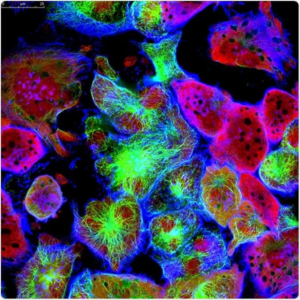
Neuroimmunology in Neurology
Introduction to Neuroimmunology
Neuroimmunology is a specialized field that focuses on the interaction between the nervous system and the immune system. Disorders in this area often involve autoimmune conditions where the immune system mistakenly attacks components of the nervous system, leading to a range of neurological symptoms. Our clinic is dedicated to diagnosing, treating, and managing neuroimmunological disorders, providing patients with expert care and the latest treatment options.
Conditions We Treat
Multiple Sclerosis (MS)
Multiple sclerosis is a chronic autoimmune disease where the immune system attacks the protective covering of nerves (myelin) in the central nervous system. This leads to communication problems between the brain and the rest of the body, resulting in symptoms such as muscle weakness, fatigue, and difficulty with coordination and balance. We offer comprehensive care, including the latest disease-modifying therapies, to manage MS and improve patients’ quality of life.Neuromyelitis Optica (NMO)
Also known as Devic’s disease, NMO is an autoimmune disorder that primarily affects the optic nerves and spinal cord, causing vision loss and paralysis. Early and accurate diagnosis is crucial for effective treatment. Our team provides targeted therapies to manage this condition and prevent relapses.Myasthenia Gravis (MG)
Myasthenia gravis is an autoimmune disorder that disrupts the communication between nerves and muscles, leading to muscle weakness and fatigue. This condition often affects muscles that control the eyes, face, and swallowing. We offer specialized treatment plans, including medications and immune therapies, to help patients manage symptoms and lead active lives.Guillain-Barré Syndrome (GBS)
Guillain-Barré syndrome is a rare autoimmune disorder in which the body’s immune system attacks the peripheral nerves, leading to muscle weakness and sometimes paralysis. Rapid diagnosis and treatment are essential. We provide intensive care and rehabilitation to support recovery from GBS.Chronic Inflammatory Demyelinating Polyneuropathy (CIDP)
CIDP is a chronic autoimmune disorder that affects the peripheral nerves, leading to progressive weakness and sensory loss. Our clinic offers a range of treatments, including immunotherapy and physical rehabilitation, to manage CIDP and improve patients’ quality of life.Lupus-Related Neuroimmunological Disorders
Systemic lupus erythematosus (SLE) can affect the nervous system, leading to neuroimmunological disorders such as lupus cerebritis, seizures, and cognitive dysfunction. We work closely with rheumatologists to provide comprehensive care for patients with lupus-related neurological symptoms.Autoimmune Encephalitis
Autoimmune encephalitis is an inflammation of the brain caused by the immune system attacking brain cells. Symptoms can include seizures, memory loss, and psychiatric changes. Early diagnosis and treatment are critical. We offer advanced therapies, including immunosuppressants and plasma exchange, to treat this condition.
Our Approach to Neuroimmunological Care
Comprehensive Diagnostic Evaluation
Accurate diagnosis is the cornerstone of effective treatment in neuroimmunology. We use state-of-the-art diagnostic tools, including MRI, lumbar punctures, blood tests for autoantibodies, and nerve conduction studies, to diagnose neuroimmunological conditions accurately.Personalized Treatment Plans
Treatment for neuroimmunological disorders is highly individualized. Our team develops personalized treatment plans that may include medications to suppress or modulate the immune system, physical therapy, and other supportive therapies. We aim to reduce symptoms, prevent relapses, and improve overall function.Immunotherapy
Immunotherapy is a key component of treating many neuroimmunological disorders. We offer the latest immunotherapy options, including intravenous immunoglobulin (IVIG), corticosteroids, plasmapheresis, and monoclonal antibodies, to manage immune system activity and protect nerve function.Multidisciplinary Care
Neuroimmunological disorders often require a multidisciplinary approach. Our neurologists collaborate with other specialists, such as rheumatologists, immunologists, and rehabilitation therapists, to provide comprehensive, coordinated care.Long-Term Management and Support
Many neuroimmunological disorders are chronic and require ongoing management. We provide continuous monitoring, regular follow-ups, and adjustments to treatment plans as needed to ensure the best possible outcomes for our patients.Research and Clinical Trials
As part of our commitment to advancing neuroimmunology, we participate in clinical trials and research studies. This allows our patients access to cutting-edge treatments and therapies that may not be widely available.
Why Choose Our Clinic?
Expert Neuroimmunology Team
Our team of neurologists specializes in neuroimmunology, bringing extensive experience and expertise in diagnosing and treating complex neuroimmunological disorders. We stay at the forefront of research and treatment developments to offer our patients the best care possible.Advanced Diagnostic and Treatment Facilities
We utilize the latest technology and diagnostic tools to ensure accurate diagnoses and effective treatment plans. Our facilities are equipped with advanced imaging and laboratory capabilities to support comprehensive care.Patient-Centered Care
We understand the impact that neuroimmunological disorders can have on your life. Our approach is centered around providing compassionate, personalized care that meets the unique needs of each patient. We work closely with you to manage your condition and improve your quality of life.Access to Innovative Treatments
Our involvement in research and clinical trials ensures that our patients have access to the most advanced treatments available. We are committed to exploring new therapies and improving outcomes for those living with neuroimmunological disorders.
Contact Us
If you or a loved one is experiencing symptoms of a neuroimmunological disorder, it’s important to seek expert care. Early diagnosis and treatment can make a significant difference in managing these conditions. Contact us today to schedule a consultation with one of our specialists.
